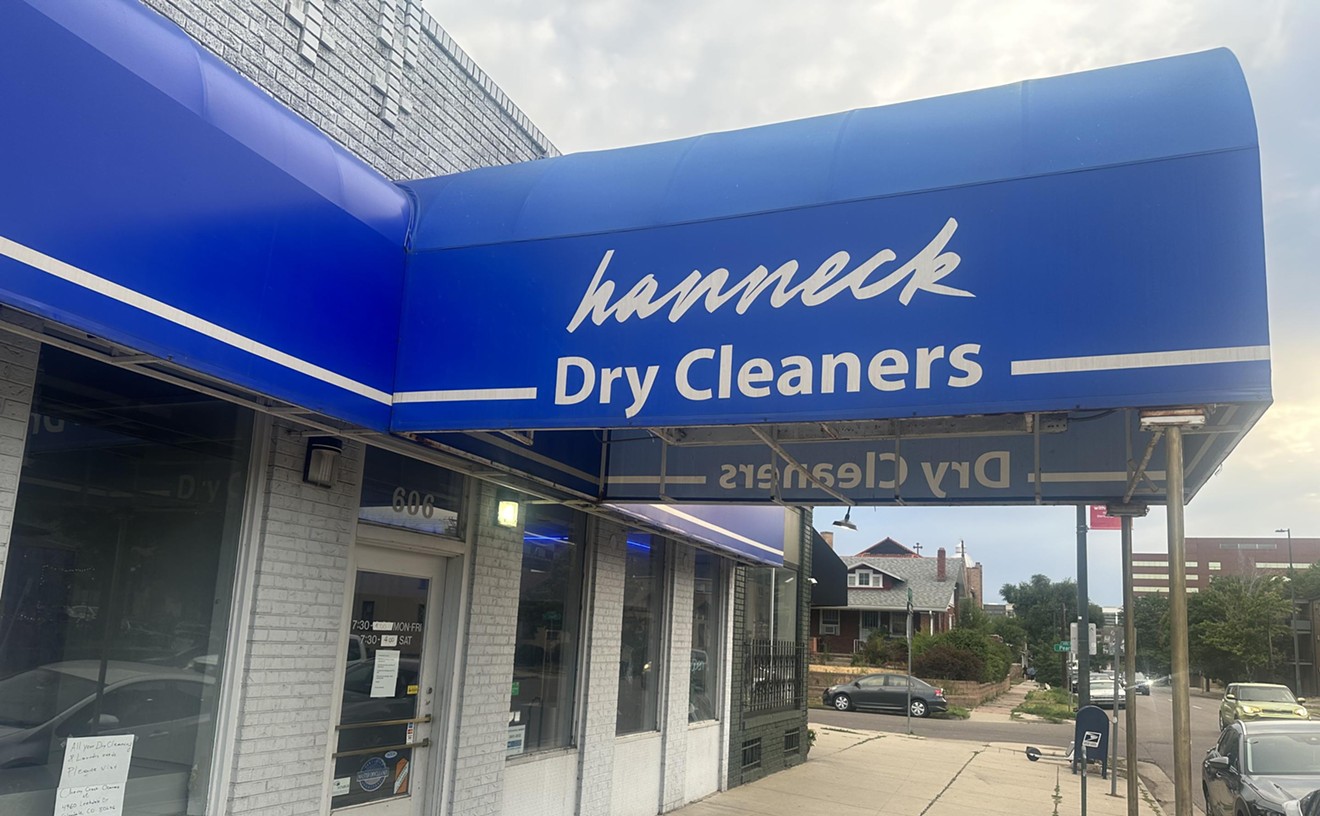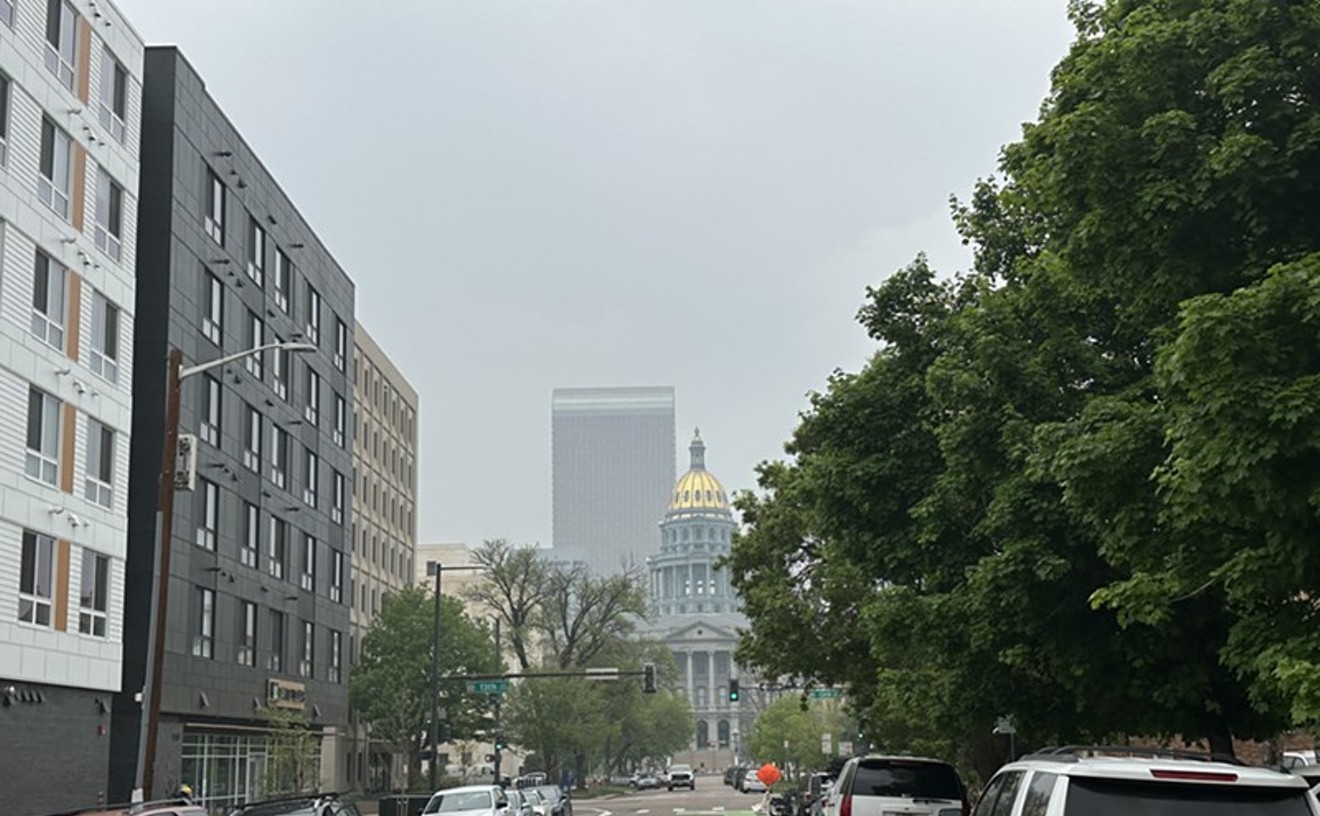Today is my last as a staff writer for Westword...after more than 32 years.
The salient facts are these: The decision was mine, the timing seems right, and I feel very grateful.
My first experience at a newspaper came via The Orange and Black, the student publication for Grand Junction High School, named after my hometown, whose most famous past scribe had been the late Dalton Trumbo, Oscar-winning member of the Hollywood Ten.
Upon graduating from Grand Junction's Mesa State College (now Colorado Mesa University) in 1983 with a bachelor's degree in both nothing and everything, thanks to my habit of changing my major every twenty minutes, I tried following in Trumbo's footsteps again by enrolling at the University of California Los Angeles's renowned graduate film program, with an eye toward becoming a screenwriter. But while I thoroughly enjoyed the process of putting together stories for cinematic presentation, I discovered that I was positively dismal when it came to the other major requirement for success in the field: the ability to pitch. When the time came to describe my vision verbally and in person rather than on the printed page, I turned inarticulate, radiating the sort of insecurity and discomfort that I could see reflected in the stricken expressions of the producers and executives capable of moving the project to the next stage. It was cringe comedy of the least funny sort.
I still wanted to earn a living by writing, but without so many apparently immovable obstacles between me and an audience. So I began applying to graduate programs in journalism and was fortunate enough to be accepted by one of the best America has to offer: Medill, at Northwestern University, located in Evanston, Illinois. A year later, I'd earned another master's degree to go with the one bestowed by UCLA in 1986 and entered the job pool, hoping to land a gig as a movie reviewer at a so-called "alternative" paper such as the L.A. Weekly, a publication that had become a favorite during my stint in Southern California.
This proved to be a tougher task than I'd envisioned. Back then, unlike now, pretty much every alt-weekly had a film critic, as did the majority of metro-area dailies and magazines. The folks with these titles had toiled for years to land such roles, however, and weren't going to give them up unless they left their cubicle feet first.
Fortunately, I stumbled upon a beguiling option: Westword, in my home state of Colorado, had an opening for a music editor. I loved music then and do now, as exemplified by my still-growing vinyl collection, and the idea of being paid for my hobby/obsession could not have been more appealing.
After sending in my application and waiting for less time than was smart, I phoned to follow up, and to my very pleasant surprise, Westword co-founder and editor Patricia Calhoun took the call and told me to send her five story ideas. I quickly mailed out ten, and when I didn't receive an immediate response, I put together another fifty.
That got her attention. Calhoun had an upcoming trip to the Chicago area planned, and she agreed to meet me at a coffee shop in the suburb of Glencoe. It was the middle of a sweltering summer, and I arrived in my best suit, a woolen outfit that would have kept me warm in subzero conditions. I spent most of the conversation worried that flop sweat would start running down my face, but Calhoun took mercy on me, asking that I pen one of my proposals on spec as a de facto tryout.
The item Calhoun selected was a snotty list of the ten musicians whose careers had been most helped by their own death, hooked to blues-rock guitarist Stevie Ray Vaughan, who was killed in an August 1990 helicopter crash. Although the results were far from tasteful, Calhoun not only published the piece, but made it the cover story of an edition that hit the streets around the time I was officially hired. Upon my arrival in Denver, the next issue was already out, and it contained several negative letters about my inaugural offering, including one written by Jane Le, soon to become Westword's copy editor and one of my most treasured colleagues. Additionally, someone had purchased an ad on the back page advising me to kill myself.
At that point, I hadn't even been to Westword's headquarters yet, and a part of me thought I should return to Illinois in shame. But I sheepishly ventured into the office anyhow and was greeted by Calhoun, who held up the ad in question and said, "Look at you. Bringing money into the paper already."
This bold attitude prevailed at Westword, and it remains a hallmark of the publication to this day.
Serving as music editor was a pleasure. From day one (October 1, 1990, to be precise), I was given incredible freedom to fill the section as I saw fit, and the attendant coverage overflowed with profiles of national artists coming to town and local talents contributing to the vibrant scene in greater Denver, critiques of concerts and recordings, sprawling columns that frequently broke convention, and more, more, more. As if that wasn't enough, I was also allowed to write and report news articles, including features, that helped me develop fresh skills and hone my craft.
Change came in 1999, when I was asked to shift my focus. I could still contribute to the music and news sections (and I did on a weekly basis for many years), but my main charge would be a media column in which I would chronicle and explore the local broadcast and print industries. At the time, both the Denver Post and the Rocky Mountain News ran media columns, but their content was generally quite polite, in part because most area publications, radio and TV stations and so on had interlocking allegiances. Since Westword wasn't part of conflicting business relationships like these, I was under no such restrictions when it came to "The Message," as I dubbed my column in an allusion to both Marshall McLuhan and Grandmaster Flash and the Furious Five, and I tried to take advantage of this scenario every chance I had.
The next significant shift happened in 2008. By that time, Westword's content had been online for around fourteen years, but the powers-that-be wanted to beef up the website with new material on a much more regular basis rather than waiting around for the print publication date. I was put in charge of The Latest Word, the name given to the blog, and tasked with producing as many posts as possible each weekday — a minimum of eight, but often as many as twelve — under the theory that if we built such a cyber-destination, readers would come.
And they did.
The concept has evolved significantly over the past decade and a half. The Latest Word spawned multiple verticals concentrating on themes such as food and drink, arts and culture, music, and marijuana, with separate landing spots devoted to Westword's annual Best of Denver awards and myriad other topics. Along the way, I went from reporting in brief about as many things as possible to producing fewer posts (typically three per day) in greater depth and detail on subjects as diverse as breaking news, politics, crime, law enforcement, social justice, education, business, media, sports and, yes, even film.
Numerically, the workload — much of it self-imposed — appeared to be lighter, but that was an illusion, especially at the height of the pandemic, when unprecedented developments popped up at a dizzying rate. Moreover, the all-too-frequently grim nature of the news made it difficult for me to leave it behind. And in the quicksilver world of 21st-century journalism, the working day no longer concludes but blends seamlessly into the next.
The grind impacted me in ways I'm still processing. But the toll has clearly been substantial.
Meanwhile, 2023 is shaping up to be a joyful one for me, my wonderful wife, Deb, and the rest of my family. Two of my three children have weddings planned for this year, and I want to be fully present for them, sans lingering mental images from some sad tale I delivered the previous day.
For these reasons and more, I'm stepping away from journalism. Maybe not forever: The door to future Westword contributions remains open, and there's every possibility that I'll walk through it down the line. At present, though, I'm seeking work that is less likely to pile on the sort of baggage that tends to jolt me awake in the middle of the night.
Please note, potential employers, that I'm a really fast typist, and I'm good at bringing people coffee.
To Westword's readers, I am forever in your debt. I saw my writing and reporting as a vehicle to inform, educate and entertain with passion, style and humor, when appropriate, and I hope I managed to achieve these goals more often than not. When I fell short, you were quick to let me know, and your unfiltered responses inspired me to keep trying to improve.
I also want to acknowledge Patricia Calhoun and the Westword crew from the administration of the first President George Bush to the present. I may have been at the same newspaper for three decades plus, but I had many different careers over that span, and your trust and faith in me made it possible. Thank you.
[
{
"name": "Air - MediumRectangle - Inline Content - Mobile Display Size",
"component": "12017618",
"insertPoint": "2",
"requiredCountToDisplay": "2",
"watchElement": ".fdn-content-body",
"astAdList": [
{
"adType": "rectangle",
"displayTargets": "mobile"
}
]
},{
"name": "Editor Picks",
"component": "17242653",
"insertPoint": "4",
"requiredCountToDisplay": "1",
"watchElement": ".fdn-content-body",
"astAdList": [
{
"adType": "rectangle",
"displayTargets": "desktop|tablet"
},{
"adType": "rectangle",
"displayTargets": "desktop|tablet|mobile"
}
]
},{
"name": "Inline Links",
"component": "18838239",
"insertPoint": "8th",
"startingPoint": 8,
"requiredCountToDisplay": "7",
"maxInsertions": 25
},{
"name": "Air - MediumRectangle - Combo - Inline Content",
"component": "17261320",
"insertPoint": "8th",
"startingPoint": 8,
"requiredCountToDisplay": "7",
"maxInsertions": 25,
"watchElement": ".fdn-content-body",
"astAdList": [
{
"adType": "rectangle",
"displayTargets": "desktop|tablet"
},{
"adType": "rectangle",
"displayTargets": "desktop|tablet|mobile"
}
]
},{
"name": "Inline Links",
"component": "18838239",
"insertPoint": "8th",
"startingPoint": 12,
"requiredCountToDisplay": "11",
"maxInsertions": 25
},{
"name": "Air - Leaderboard Tower - Combo - Inline Content",
"component": "17261321",
"insertPoint": "8th",
"startingPoint": 12,
"requiredCountToDisplay": "11",
"maxInsertions": 25,
"watchElement": ".fdn-content-body",
"astAdList": [
{
"adType": "leaderboardInlineContent",
"displayTargets": "desktop|tablet"
},{
"adType": "tower",
"displayTargets": "mobile"
}
]
}
]













